Moldova and Ukraine's EU candidacy status: What does it mean?
The Republic of Moldova and Ukraine were granted the status of "candidate countries" to the EU as early as last year. Georgia was not granted that status at the time, although Tbilisi and Chisinau simultaneously signed an application to join the EU in March 2022, eight days after the start of Russia's invasion of Ukraine. But for ordinary citizens travelling to the Schengen area and the EU, that doesn't change much for now.

The Republic of Moldova and Ukraine have been granted "candidate" status since last year
But EU membership cannot come soon, and the procedure is very complex and lengthy. Most experts estimate that Moldova could join the EU after 2030 at the earliest.
Apart from Moldova and Ukraine, the 'candidate countries' are currently Albania, Macedonia, Montenegro, Serbia and Turkey. But the EU has been going through what is known as 'enlargement fatigue' for some time. The EU's population, capitals and political parties no longer want to continue taking in new members, especially poor former communist countries in Eastern Europe.
There is no precise timetable for the negotiations
Then, there is no precise duration of the negotiations. They can last for years, and in theory even decades. They can be blocked indefinitely at the request of one or other of the member countries. The case of Turkey, for example, is an extreme one. Turkey signed an association agreement with the EU 60 years ago: in 1963. Turkey then became a candidate country in 1999 and started negotiations in 2005. Croatia, on the other hand, which started its negotiations at exactly the same time as Turkey, in 2005, concluded them in 2011 and has been a member of the EU since 2013.
"Special procedure" for Ukraine?
Of course, one can imagine that the twenty-seven could create a "special procedure", as Zelenski demands. But even so, the EU is so complicated that the process would still be very long: negotiations between member states, unanimous agreement, ratification of the treaty reform by the European Parliament and the twenty-seven national parliaments (or by referendum). Experience shows that it takes at least three to four years to amend the smallest piece of treaty text...
Accession negotiations go chapter by chapter
Negotiations, once started, go by chapters, by sectors of the economy, about 30 in all. The most complicated negotiations are generally in agriculture, steel and textiles.
Not all chapters are binding. Chisinau, for example, does not have to worry about marine fisheries. But there may be unexpected obstacles from other countries. Until 2013, for example, negotiations with Croatia had been blocked for a long time by tiny Slovenia, an EU member since 2004, which had a series of disputes with Croatia inherited from the Yugoslav period. Slovenia has a veto, like all other members, on enlargement, and has sought as many concessions from Croatia as possible, notably a wider corridor in the territorial waters around the Istrian peninsula and funds locked up in a former Yugoslav bank since the outbreak of the Balkan wars.
Finally, there is now a tacit consensus among EU members that once Croatia takes over in 2013, almost a decade already, EU enlargement will stop, at least in the medium term.
European elections in 2024: an obstacle
Then, EU enlargement would not be a popular theme at all in the European elections to be held in June 2024. Add to that the fact that the EU cannot welcome a country with blurred borders or with foreign troops on its territory (Russian forces in the separatist region, in the case of Moldova).
The only other case that could set a precedent is Cyprus, which was admitted to the EU in 2004 as part of the then ten-country package, including eight Eastern European countries. It's what was then called a political Big Bang, but it's clear today that that 2004 Big Bang was a mistake. Most of those countries were not politically, economically, socially and culturally ready to join the EU, you can see it from the current drift of Poland and Hungary.
The method of communist DDR/RDG Germany, which did not have to negotiate
About a decade of negotiations has so far been the average, once granted candidate status, that if For Moldova, the quickest solution, according to many analysts would be a union with Romania. Possibly following the Cuza method, with the same candidates on both sides of the Prut.
How? Would the EU not agree to such a back-door reception of Chisinau? But the great powers did not agree with the 1859 union either, making it conditional on the union being for the duration of Cuza's term of office only, and even the former communist Germany DDR/RDG was received in the same way, with absolutely nothing to negotiate. candidate countries" to the EU.
Georgia did not receive that status at the time, although Tbilisi and Chisinau simultaneously signed an application to join the EU in March 2022, eight days after the start of Russia's invasion of Ukraine. But for ordinary citizens travelling to the Schengen area and the EU, that doesn't change much for now.
Translation by Iurie Tataru




